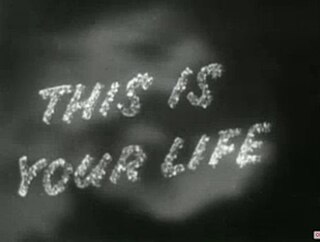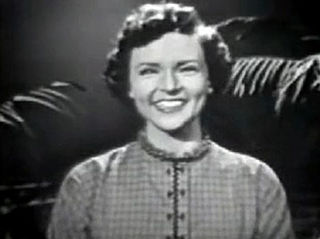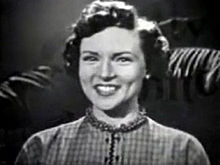
Stephen Valentine Patrick William Allen was an American television and radio personality, comedian, musician, composer, writer, and actor. In 1954, he achieved national fame as the co-creator and first host of The Tonight Show, which was the first late-night television talk show.
The Golden Girls is an American sitcom created by Susan Harris that aired on NBC from September 14, 1985, to May 9, 1992, with a total of 180 half-hour episodes, spanning seven seasons. Starring Beatrice Arthur, Betty White, Rue McClanahan and Estelle Getty, the show is about four older women who share a home in Miami, Florida. It was produced by Witt/Thomas/Harris Productions, in association with Touchstone Television. Paul Junger Witt, Tony Thomas, and Harris served as the original executive producers.

Betty Marion Ludden was an American actress and comedian. A pioneer of early television with a career spanning almost seven decades, she was noted for her vast number of television appearances acting in sitcoms, sketch comedy, and game shows. She produced and starred in the series Life with Elizabeth (1953–1955), thus becoming the first woman to produce a sitcom.

This Is Your Life is an American reality documentary series broadcast on NBC radio from 1948 to 1952, and on NBC television from 1952 to 1961. It was originally hosted by its creator and producer Ralph Edwards. In the program, the host surprised guests and then took them through a retrospective of their lives in front of an audience, including appearances by colleagues, friends, and family. Edwards revived the show in 1971–1972, and Joseph Campanella hosted a version in 1983. Edwards returned for various specials in the late 1980s.

Valerie Anne Bertinelli is an American actress and television personality. She first achieved recognition as an adolescent, portraying Barbara Cooper Royer on the sitcom One Day at a Time (1975–1984), for which she won two Golden Globe Awards for Best Supporting Actress in a Series, Miniseries or Television Film. She subsequently earned adult stardom as Gloria on the religious drama series Touched by an Angel (2001–2003), and Melanie Moretti on the sitcom Hot in Cleveland (2010–2015), which brought her a Screen Actors Guild Award nomination. In 2012, she received a star on the Hollywood Walk of Fame.

Edward Albert Heimberger was an American actor. He is known for his roles on stage and screen and received nominations for two Academy Awards, a BAFTA Award, and two Golden Globe Awards.
Broadcast programming is the practice of organizing or ordering (scheduling) of broadcast media shows, typically radio and television, in a daily, weekly, monthly, quarterly, or season-long schedule.

Arlene Francis was an American game show panelist, actress, radio and television talk show host. She is best known for her long-running role as a panelist on the television game show What's My Line?, on which she regularly appeared for 25 years, from 1950 to 1975, on both the network and syndicated versions of the show.

Lux Radio Theatre, sometimes spelled Lux Radio Theater, a classic radio anthology series, was broadcast on the NBC Blue Network (1934–35) ; CBS Radio network (1935–54), and NBC Radio (1954–55). Initially, the series adapted Broadway plays during its first two seasons before it began adapting films. These hour-long radio programs were performed live before studio audiences. The series became the most popular dramatic anthology series on radio, broadcast for more than 20 years and continued on television as the Lux Video Theatre through most of the 1950s. The primary sponsor of the show was Unilever through its Lux Soap brand.
Roger Lodge is an American TV game show and sports radio host and actor. He is known for hosting the syndicated dating show Blind Date. Lodge's acting credits include appearances on the ABC sitcom Full House; CBS's Yes, Dear; and UPN's The Parkers. He also appeared in the Tony Scott film The Fan and Not of This Earth. He hosts The SportsLodge on radio station KLAA AM 830, which is owned by the Los Angeles Angels baseball team and serves as their radio flagship station. He also hosts the Angels pregame show on AM 830 and the Angels Baseball Radio Network.

Faye Margaret Emerson was an American film and stage actress and television interviewer who gained fame as a film actress in the 1940s before transitioning to television in the 1950s and hosting her own talk show.

Boris Karloff (1887–1969) was an English actor. He became known for his role as Frankenstein's monster in the 1931 Frankenstein, leading to a long career in film, radio, and television.

Arthur Chester Duncan was an American tap dancer, also called an "Entertainer's Entertainer," known for his stint as a performer on The Lawrence Welk Show from 1964 to 1982. This, along with his earlier inclusion on The Betty White Show in 1954 and with the help of White herself, made him the first African-American regular on a variety television program. He performed all over the world, and notably at Lincoln Center and Carnegie Hall.

An anthology series is a written series, radio, television, film, or video game series that presents a different story and a different set of characters in each different episode, season, segment, or short. These usually have a different cast in each episode, but several series in the past, such as Four Star Playhouse, employed a permanent troupe of character actors who would appear in a different drama each week. Some anthology series, such as Studio One, began on radio and then expanded to television.
Frederick Jay Roggin is an American sports anchor currently with Los Angeles sports radio station KLAC. He is best known for his career at KNBC-TV. Born in Detroit, Michigan, Roggin was also a sports talk radio host at KMPC in Los Angeles and is currently co-hosting, alongside Rodney Peete, an afternoon sports show on KLAC. Roggin's other co-hosts on KLAC had included Los Angeles Times sports columnist T. J. Simers and Simers' daughter Tracy. Roggin served as a host for NBC Sports coverage of the 2008 Summer Olympics.
Donald Joy Fedderson was an American executive producer who created a number of television programs including The Millionaire, My Three Sons and Family Affair.

The Colgate Comedy Hour is an American comedy-musical variety series that aired live on the NBC network from 1950 to 1955. The show featured many notable comedians and entertainers of the era as guest stars. Many of the scripts of the series are archived at the UCLA Library in their Special Collections.

Life with Elizabeth is an American television sitcom starring Betty White as Elizabeth and Del Moore as her husband Alvin; Jack Narz is the on-camera announcer and narrator. The series aired in syndication from October 7, 1953, to September 1, 1955. The show was the first of many sitcoms for Betty White across the decades and was based on sketches involving the Elizabeth character that she had performed on her earlier talk show Hollywood on Television.

Bride and Groom is a 1951–58 American daytime television series. It was originally broadcast on CBS from January 25, 1951 to October 9, 1953, and then moved to NBC for a run from December 1, 1953 to August 27, 1954. After a pause, the show returned on NBC from July 1, 1957 to January 10, 1958. It could be considered an early reality series. The series presented marriages live on the air, but these couples were not put together for the purpose of the program. Couples who were intending to get married could apply to be married on the show. The CBS episodes aired in a 15-minute time-slot, with two commercial breaks.

Hollywood on Television is a five-and-a-half-hour, six-day-a-week live television talk show that starred newcomer Betty White and radio disc jockey Al Jarvis that ran from 1949-1953. When Jarvis left the show in 1951, film star Eddie Albert took his place and co-hosted with White for six months until thirty-three and a half hours of live ad-lib television per week, featuring just the two of them, took its toll and he also resigned. White was then hosting the show alone and is believed to have been the first female television talk show host as a result. After a period of White talking directly into the camera lens for hours at a stretch, the show began accepting guests to interact with her as well as gradually incorporating scripts and sketches.















